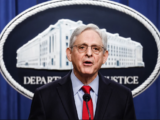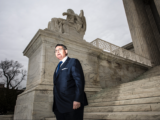
President Barack Obama appoints Judge Merrick Garland to the U.S. Supreme Court in the Rose Garden of the White House: Reuters
By Glynn Wilson –
President Barack Obama nominated veteran appeals court judge Merrick Garland of Illinois to the U.S. Supreme Court on Wednesday, a moderate intended to head off a political showdown with Senate Republicans who vow to block any nominee to the high court by this controversial Democratic president.
Garland, 63, now serves as chief judge of the U.S. Court of Appeals for the District of Columbia. He’s president Obama’s choice to replace conservative Justice Antonin Scalia, who died in February.
The nomination took place in the White House Rose Garden, where President Obama urged Senate Republicans to consider the nomination on their spring break. He claimed faith in the American justice system is at stake.
“I’ve selected a nominee who is widely recognized not only as one of America’s sharpest legal minds but someone who brings to his work a spirit of decency, modesty, integrity, even-handedness and excellence,” the president said. “These qualities and his long commitment to public service have earned him the respect and admiration of leaders from both sides of the aisle.”
Some Senate Republicans, who control the upper chamber with a majority, have said they will not even hold confirmation hearings or vote on any nominee selected by the Democratic president for a lifetime position on the court. Senate confirmation is required for any nominee.
The White House noted that seven current Republican senators voted to confirm Garland to the D.C. Circuit court in 1997.
The president said if Senate Republicans refused to carry out their constitutional duty to consider Garland’s nomination, the reputation of the Supreme Court and faith in the American justice system would suffer.
“Our democracy will ultimately suffer as well,” President Obama said. “I have fulfilled my constitutional duty. Now it’s time for the Senate to do theirs. Presidents do not stop working in the final year of their term. Neither should a senator.”
He said he hopes the Senate will do its constitutional duty and hold a “fair” hearing on Garland. “I hope they will be fair,” the president said.
The nine-member U.S. Supreme Court is evenly split with four liberals and four conservative justices, according to mainstream news organizations.
“Obama’s nominee could tilt the court to the left for the first time in decades,” according to Reuters, although that is not clear from his past since he has a record of upholding the law in a non-partisan way. Many presidents in the past have been surprised by the direction taken by justices they appoint to the high court, so there is no way to guarantee any idealogical leanings in a nominee to a lifetime position.
Garland was under consideration by President Obama when he filled two prior high court vacancies. He appointed Sonia Sotomayor, who at 55 became the first Hispanic justice in 2009, and Elena Kagan, who was 50 when she became the fourth woman ever to serve on the court in 2010.
Standing in between the president and Vice President Joe Biden during the Rose Garden ceremony, Garland told Mr. Obama it was a great privilege to be nominated to the high court by a fellow Chicagoan.
“For me there could be no higher public service than serving as a member of the United States Supreme Court,” Garland said. If confirmed, he would become the fourth Jewish member of the nine-member court.
In a bio on the White House Website, Chief Judge Merrick Garland is touted as “the most qualified person to immediately serve on the Supreme Court.”
He currently serves as Chief Judge on the U.S. Court of Appeals in D.C., a court to which he was confirmed with majority support from both parties in the U.S. Senate in 1997. Now presiding as Chief Judge, Judge Garland “has more federal judicial experience than any Supreme Court nominee in history.”
Born and raised in Illinois and a “devoted family man,” Judge Garland has dedicated his life to serving the American people, taking on some of the most difficult anti-terrorism cases in our nation’s history. In the wake of the Oklahoma City bombing, he led the investigation and prosecution that ultimately brought Timothy McVeigh to justice. As a mentor to his law clerks and a tutor to elementary school children, he is a “dedicated and compassionate public servant who conservatives and progressives praise for his rigorous intellect, his respect for the role of the judiciary, and his mastery of the law.”
Judge Garland’s oversaw some of the most important federal criminal cases in recent history, including the prosecutions of Timothy McVeigh and Terry Nichols for the Oklahoma City bombing as well as the government’s responses to the Unabomber and the Montana Freemen.
He took steps as a government attorney to ensure proper respect for the rights of criminal defendants, helping develop policies that require prosecutors to conduct an individual assessment of each case when making charging decisions, rather than just charging with the most serious offense possible
He was confirmed to the D.C. Circuit in 1997 with strong bipartisan support from a majority of both parties in the U.S. Senate
He has distinguished himself as a jurist who decides every case based on what the law requires. He has been quoted as saying: “The role of the court is to apply the law to the facts of the case before it.” In other words, it is not the job of a judge to make law.
Watch the video of the president’s appointment.
Watch the White House video bio of Judge Garland.













